This may honestly be one of my favourite films to date, and also the only Italian film I've ever watched. For some reason, the whole holocaust thing seemed confined to just one area (yes, ignorance mmhmm) and I had never imagined it in any other context, much less in Italy.
I have so many feelings about this film, I'm having trouble articulating them into actual coherent sentences. It's just mind-blowing really, how good it is.
Although at first, Guido seems like a very silly and ridiculous character, somewhat brushing off all the warning signs of the upcoming holocaust with humour. Everything that happens almost seem like unrealistic coincidences, and while they are to some effect, it is portrayed in a way where we realise he actually picks up on all these small details and mould them so they fit his insanely positive and dreamlike ideas of reality, with his quick wit and stubbornness. We see that he's actually someone with a lot of foresight and also someone who has found a deeper meaning in life and is determined to live out his life according to that.
We expect his optimism to fade when he's in the concentration camp, maybe this story is about how one must face the harsh realities of life. It doesn't. Instead he tries even harder.
The enthusiasm never fades, only grows. This can be interpreted in two ways, one that he is completely disillusioned and prefers to live solely in his world where magical coincidences happen, or two, that he is an incredibly resilient father and husband who maintains his facades for the sake of his son. The latter brings me to the subject of protecting innocence (but we'll get to that later). Obviously, I prefer the second. It's not that he doesn't realise the situation he's in and is ignorant of it, it's just that he realises the importance of other things, like to satisfy his meaning in life in relation to his wife and son... and another thing, for love. (ngawsshhhhhh <3) We see this time and time again where he shapes situations into something better for his wife and child, displaying great bravery as well. For instance, when he was a waiter at the camp, he noticed a gramophone and started broadcasting a song for his wife, even though she may not hear it, even though he may be caught and punished.
We see this to a greater effect in relation to Giosue (Joshua) his son. He creates crazy elaborate alternate realities for his son to shield him from the horrors of the current situations, twisting the concentration camp horrors into a game where the winner gets a tank. While this may be bad in the long run, one can understand why he would do so, although the lengths he goes to is a little insane sometimes. For some reason, maybe evolutionary or just out of love, people are inclined to go to great lengths to protect the innocence of children. In this case, he hides his own fears, masking it with an overdone sense of joy for his child.
However, there are instances where despite this, I feel, Giosue does know something is up. It's not really obvious but we do see a sort of realisation in his eyes, but his love and admiration for his dad helped him go with it. Despite the corniness, it's amazing what love can make people do. This made the scene where the tank coincidentally appeared more impactful. It's like, a final thing that Guido could not have in any way planned.
I read this study once which was interesting, about how just thinking about childhood, good or bad, invokes the idea of innocence and promotes prosocial behaviour (ok, it's quite unrelated to this, but it's really an interesting study ahaha).
It almost seems like he doesn't realise the gravity of his situation as he looks almost deliriously happy while he's in the camp. But he does, and these are one of the instances where we actually see his facade drop. We watch as he realises what happening, like when he first sets foot into the camp room and etc. his facade drops and we see the real person. As many others will probably say, it's quite amazing how such a dark event can be portrayed alongside such humour and comedy. It's even more amazing that he manages to do so without making a mockery of the event and while the humour is present throughout, we still see the darkness the holocaust brings (subtly, but isn't that always lovely? :D) For instance, even through the lightness of the first half, we see hints of the eventual holocaust, such as the facism perpetuated by shop owners, the green horse, the math questions in school.
As many others will probably say, it's quite amazing how such a dark event can be portrayed alongside such humour and comedy. It's even more amazing that he manages to do so without making a mockery of the event and while the humour is present throughout, we still see the darkness the holocaust brings (subtly, but isn't that always lovely? :D) For instance, even through the lightness of the first half, we see hints of the eventual holocaust, such as the facism perpetuated by shop owners, the green horse, the math questions in school.
 As many others will probably say, it's quite amazing how such a dark event can be portrayed alongside such humour and comedy. It's even more amazing that he manages to do so without making a mockery of the event and while the humour is present throughout, we still see the darkness the holocaust brings (subtly, but isn't that always lovely? :D) For instance, even through the lightness of the first half, we see hints of the eventual holocaust, such as the facism perpetuated by shop owners, the green horse, the math questions in school.
As many others will probably say, it's quite amazing how such a dark event can be portrayed alongside such humour and comedy. It's even more amazing that he manages to do so without making a mockery of the event and while the humour is present throughout, we still see the darkness the holocaust brings (subtly, but isn't that always lovely? :D) For instance, even through the lightness of the first half, we see hints of the eventual holocaust, such as the facism perpetuated by shop owners, the green horse, the math questions in school.
But we see Guido sort of fighting the system, trying to educate the kids in a fascist classroom using his humour, showing us his political stance right from the start. In a way that makes him look silly, and yet he's not. He speaks the truth, about superiority in a way young kids can understand, and it is there we realise he's actually much more than just a ridiculous person. He's actually well aware of the happenings, but chooses not to focus on them in their negativity.
"Fat, fat, ugly, ugly, all yellow in reality.
If you ask me what I am, I answer 'quan, quan, quan'.
Walking along, I go 'poo poo'.
What am I? Tell me true."
Guido's reaction to that riddle is just... heartbreaking and one can imagine why. In a time where he has to lie to his son on a daily basis, making the holocaust seem like an amazing reality, this doctor has the audacity to come to him asking for his help, even saying "help me, I can't sleep at night because of this". Ughhhh. The triviality of the doctor's "problems", if it can even be called that, is just infuriating. Although the doctor does nothing overtly terrible, he treats everyone sort of with respect etc., his acceptance/ ignorance to whatever is happening to the Jews at that time/ his absence of guilt is just.... The doctor's character to me symbolises how the holocaust is perpetuated by people. Some actively participate (cognitive dissonance yadda yadda) but a large majority of good seeming people... they simply stood by and accepted the happenings. This actually reminded me of the mayor's suicide in Mississippi Burning, anyone who lets these things happen is just as guilty as the facists who pull the trigger.
Although this instance is enough to explain Guido's expression of sad realisation and disbelief, there's actually more to it. The answer to the riddle (by a Nazi) is actually, yeah, "a Jew". And now, it makes sense, the yellow, the degrading description ( also, 'quan' is spelt as 'coin' in italian, referring to money).
Silence is the most powerful cry,
is it really? I don't know.
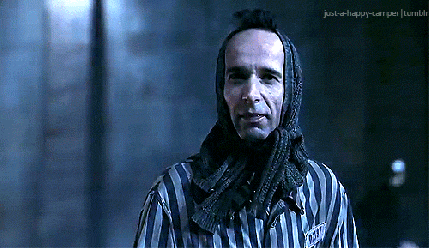
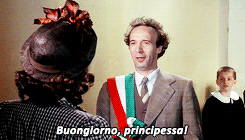
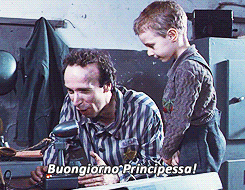
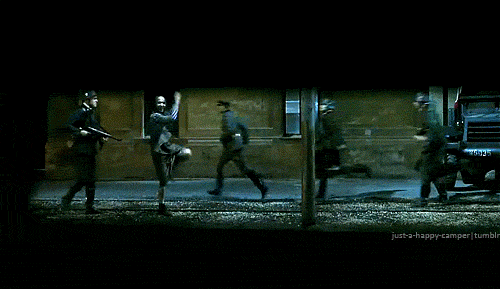
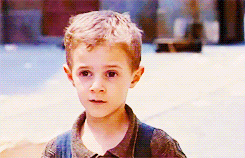
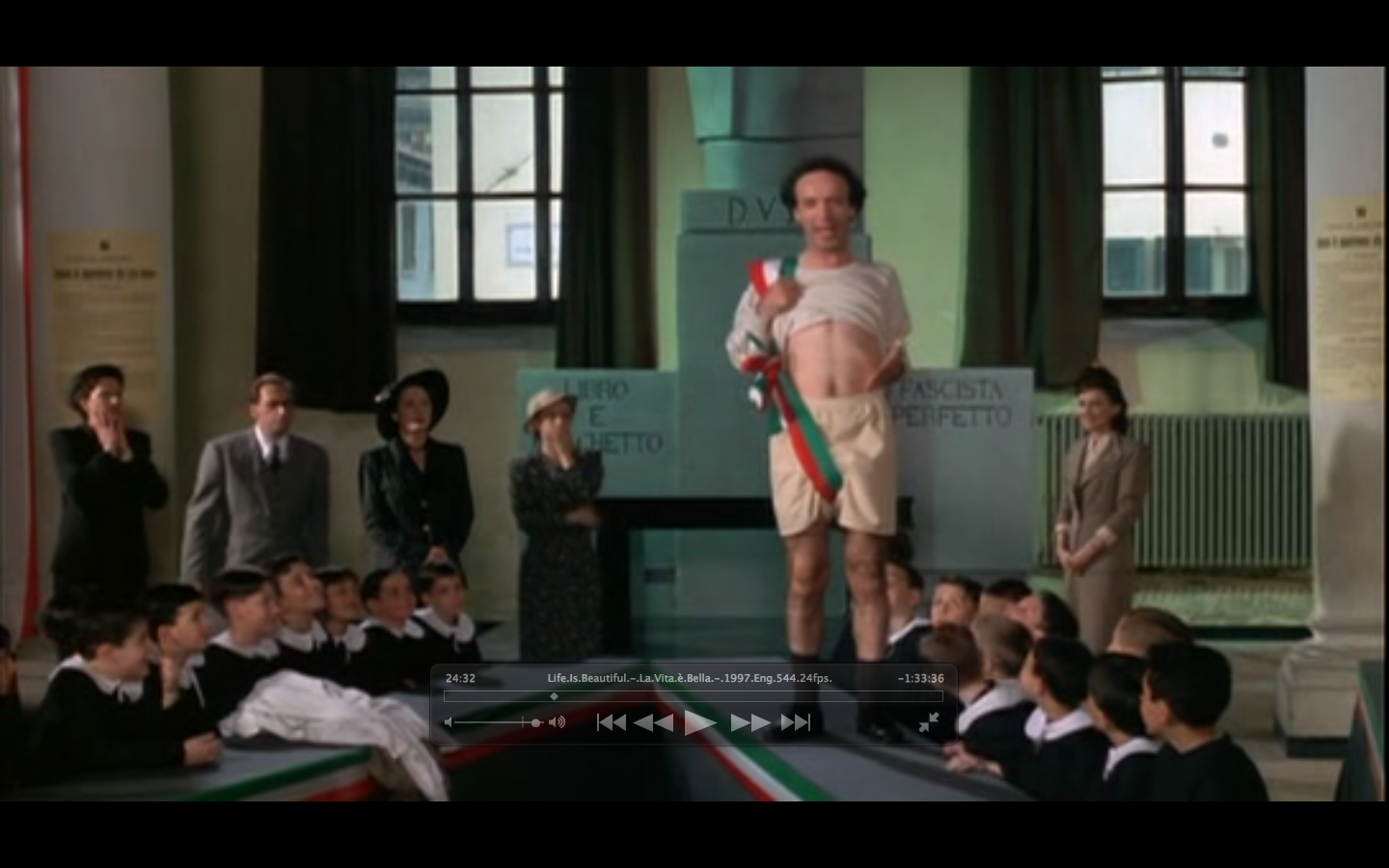

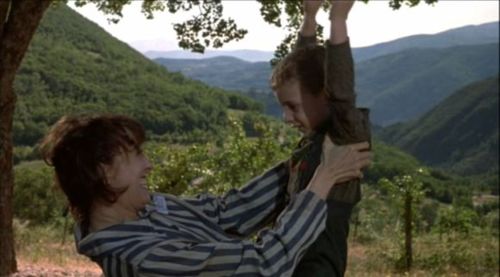





.JPG)

0 comments:
Post a Comment